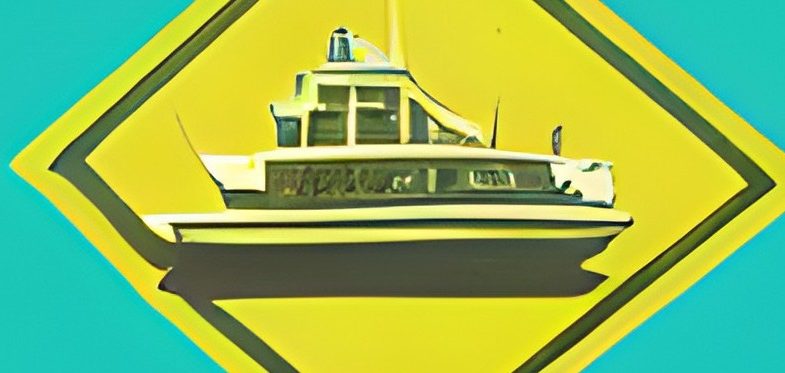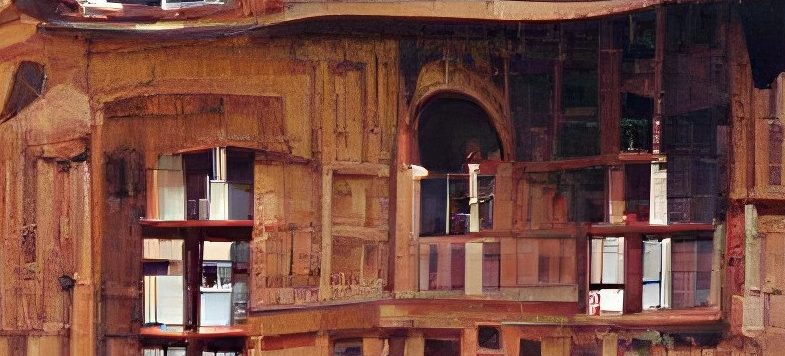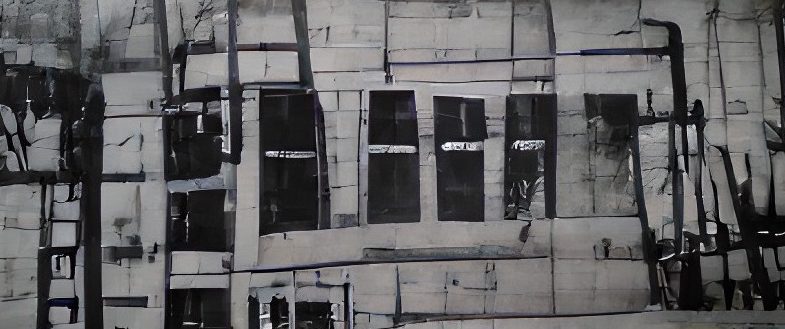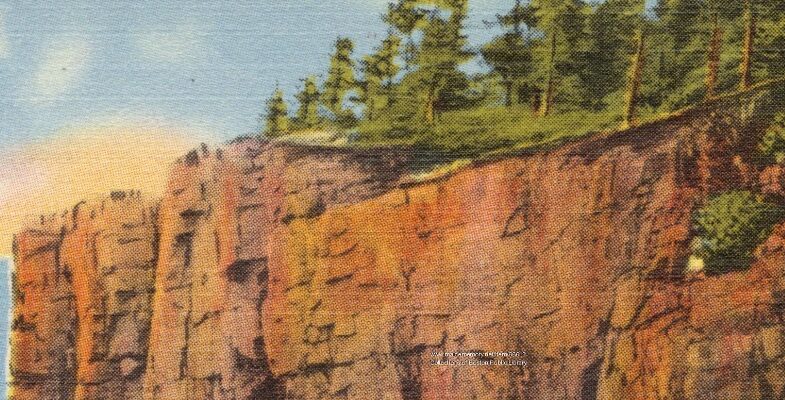When the ferry began to sink, Bobby didn’t know what to do. He had never been on a boat before, but any fool could tell something had gone wrong. In the Atlantic Ocean, on its way to Kocratoke Island, filled with over a dozen vehicles of families and tourists, the ferry jolted to a sudden and painful stop, lurching as if it had reached the end of a rope.
Upstairs, in the passenger bay, a quick grab at a handrail kept Bobby from splitting his head open. What leapt to his mind, though, wasn’t the old Datsun stuffed with all of his earthly possessions, but that he had briefly left Willow in the passenger seat. He had made the young dog as comfortable as he could after the long, hot journey they’d endured together, but had to run up to the passenger deck to find a bathroom. The screaming children and confused adults around him stabbed a reminder into his heart that she was alone.
Many things had led to Bobby being on that ferry, not the least of which was his grandfather having the grace to finally die after a long and bitter life. Even more important, though, had been finding Willow by the side of the road. Bobby wasn’t sure what travails had left the animal there, but she was bleeding and panting and so dehydrated as to be unable to move.
Despite the insults he knew would come from his grandfather for bringing a mongrel home, Bobby had done just that, the old man too much of an invalid to do much about it. He was still afraid enough of the old man, though, that he hadn’t mentioned the money he spent to nurse Willow back to health.
Willow had quickly bounced back from her abused state and rewarded Bobby with a loyalty that confounded him in its completeness. He did all the same things for Willow he had done for his grandfather; walking her, feeding her, cleaning up after her shit, washing her. In return, though, he had received affection and faithfulness rather than resentment and derision. Perhaps because he suspected some great cruelty at play in her abandonment, he quickly grew fond of her as well. Or maybe it was just the fact that the dog was so damn adorable.
He didn’t understand it, but when an old friend had offered him a summer job on the island, away from the Alabama homestead that had been his prison, his first question had been if he could bring Willow. When his friend assured him that the island was as friendly to dogs as any place on earth, Bobby had accepted his offer before he asked about any other details.
An island, being an island, though, required a ferry, four of which came and went to the island everyday. Not the one Bobby was on, though. Moments after the grinding, staggering stop, a klaxon sounded twice and a booming PA announced emergency measures that couldn’t penetrate the fear flooding Bobby’s brain as he sprinted back to his car.
A crew member stood near a massive locker, grabbing lifejackets from it and forcing them into the hands of any of the increasingly panicked passengers who passed near him. Bobby grabbed two, and would remember the sailor’s grim determination to help others for the rest of his life.
On the open vehicle deck, Bobby could see black smoke rising from the ferry’s aft, the sea smell combining with burning oil, a fiery slick on a salt platter. His worn sneakers slipped on the deck as the ferry tilted, taking water on from the downward side. The various vehicles, lined up in columns in a neat parade, crushed against one another, combining their weight to tilt the ferry ever more towards capsizing.
With water pouring onto the deck, a heavyset older man struggled with the trailer that held his own small boat, trying to free the watercraft so it could float away from the ferry’s demise. Seeing the man’s flabby arms wiggle with frustration to free the trailer’s lines, Bobby stopped to aid him. Surely more passengers could be saved by this than lifejackets. Before he could lend a hand to its untangling, though, the man swung a fist backward and snarled, making it clear that he had no interest in sharing.
In answer, a wave came over the gunwale to swamp both men and everything around them, pushing cars around and crushing the small craft between two of them. Drenched and sputtering out briny water, the man cleared his eyes enough to see both his boat and escape plan in wreckage. He cursed and hurled his baseball cap at it, then more profanities at Bobby, as if his interference were to blame. The now bald man wrenched one of the lifejackets from him and stumbled away.
Wasting no more time with passengers, Bobby found the Datsun similarly trapped between two massive SUVs. Bobby could see Willow, though, her brown eyes and fur blurring in the car’s interior as she scratched her fear against the cracked glass. Bobby tried to calm her, but panic in heated breath and dodging eyes only relayed between them through the slit he had left open for her in the windows.
He could hold onto her, they could float together, this would be a disaster they could survive, but first he had to get her out – this is what he told himself in thoughts so fast they sped through his fingers to strap into the lifejacket. The spray from the roll of the ferry stripped away whatever caution might have remained and Bobby braced himself against another car to kick in the Datsun’s window, breaking its frame enough to give Willow room to wiggle through. She scratched getting out, Bobby helping to wrestle her free.
Holding Willow in his arms, he rolled across the collapsing hoods of the other automobiles as they slid in the ever downward direction of the tilting ferry. A few of the crew pointed passengers towards a clear exit into the water, free from inching vehicles or other dangers, and Bobby headed that way even as Willow crushed herself to his chest.
Moving towards that line, Bobby was thrown from his feet by the loudest sound he had heard since his grandfather had fired off a shotgun next to his ear. Unlike when he was a boy, the sound that followed wasn’t his grandfather’s laughter, but a grinding like a giant bending iron in its hands.
The world spun Bobby and Willow as the deck came away from them. Gripping her tight, Bobby felt himself fall into the ocean, its shocking, cold water only matched by the pull of the ferry and its cargo as they rapidly sank. It was force enough that in the dark and the chill, Willow was ripped from his arms.
Even as his lifejacket pulled him to the surface, Bobby grasped at nothing, blindly searching for his friend. Eternities later, still empty-handed, he emerged into the bright light and breathable air of the surface. Expelling seawater from his mouth, he blinked the salt out of his eyes, swiveling his head in search before he could really even see. With the first breath in his lungs that could manage it, he screamed Willow’s name.
Calamity around them, Bobby still sobbed relief when Willow’s head emerged from the water. Her wet fur plastered to her, making her appear several sizes smaller, weighing her down, as she paddled desperately to stay afloat.
Yards away she was, though, and it felt like football fields as Bobby swam towards her, watching her struggle. When he crossed that distance, he found he didn’t have the strength to hold onto her terrified, wriggling form, Willow too blind and panicked to know staying still was their only chance of survival. His own attempts at calming her made no improvements and she kicked and scratched, pushing away from him. The rejection hurt him in a way his grandfather never could, his brain locking up around the problem of how to save them both.
Then he spotted the orange flotation ring, bobbing up and down on the deep blue sea. Bobby hooked his arm under Willow as best he could and swam towards it, the forced movement only causing her to move more frantically. But closer, he released her, gently pushing her towards it, and she pawed at the circle as she had at him, battering it until her forepaws came to rest there, keeping her afloat as she panted.
With everything he owned sinking to the bottom of the ocean, Bobby breathed a sigh of relief as Willow rested her forepaws on the float. Her eyes cleared and she stared at Bobby with the bewildered expression of survivors of sudden disasters everywhere, and in his gratitude he felt his eyes give up more salty water to the ocean.
That stopped though, as the erstwhile boat-owner’s bald head surged out of the ocean. The man spit water to the sky and thrashed about, cursing the sea as a bitch the moment he had enough breath in his lungs to do it. Somehow, in the panic from the ship, he had lost the lifejacket he had stolen from Bobby, and Bobby’s life experiences made him doubt the fat man had given it away.
Bobby scanned the rising and falling waves for something for the man to float on, until he saw his bloodshot eyes now locked onto himself and Willow. Seeing this too, Willow let out a small growl. She was always a good judge of character.
With an unexpected ferocity, the man began swimming towards them, and Bobby maneuvered between the man and Willow. A more competent swimmer, the man managed to get close enough to lay a hand on the ring, threatening to take it from Willow.
Bobby grabbed the ring, trying to keep it close to her, but the other man tore it away. As she struggled to stay afloat, Bobby and the bald man engaged in a tug-of-war, wasting energy no one had to spare. While the man may have been bigger, Bobby had the buoyancy of his lifejacket and when his pleas for calm went unheeded he let go of the ring to grab the man’s shoulder and lean forward, pushing him back under the water.
In holding the him under the waves, feeling him wrestle and punch, Bobby’s own fear and panic condensed into a clarifying anger. In that moment, he was certain he could weather the increasing struggles telegraphing up his arms. Bobby breathed in and out, holding the bald man under until he felt his thrashing begin to subside, growing more certain he could stay on top until there was no one left to let rise beneath him.
He kicked off the old man, pushing him away, using the force to maneuver back to Willow. He grabbed the flotation ring and placed it around the dog. She rested on it again even as Bobby could hear the other man rise to the surface, his swears reduced to muted gasps.
In the distance, the sound of other survivors could be heard, some calling out, others wailing. The noise made Bobby pull Willow and her ring protectively closer and he kept his eyes on the man as he struggled to tread water. “You ready to calm down now?” Bobby asked him.
The man screamed something back and Bobby waited till he was done before changing his question into a command. “Calm down!”
Chin barely above the surface, the man’s angry, bloodshot eyes transformed with pleading. “I don’t get something to float on I’m gonna drown.”
With Willow safely in the middle of the ring, Bobby held onto its edge as he answered, “You can share this.”
Still suffering from the violence Bobby had inflicted on him to protect Willow, some piece of the man’s anger came back with a, “It’s just a dog!”
The man seemed more willing to drown rather than to cooperate. To make his options clear to him, Bobby said, “And you’re just some asshole alone in the ocean.” The many ways in which he had thought about walking out on his grandfather played out in his mind as he asked, “Anyone gonna miss you?”
That calmed the son of a bitch right down. As cautious as a hostage exchange, he swam over to the ring and placed a hand on it, just kept afloat by it even as Willow and Bobby kept a wary eye on him. They didn’t speak, even when they saw a flare go up, or when the Coast Guard cruiser arrived, or when Bobby let the other man get pulled on board the rescue ship before him or Willow.
Onboard, Bobby held her close and her tongued lolled out happily as he dried her with a towel a sailor gave them. She didn’t seem to care that everything they owned was at the bottom of the Atlantic and he decided he shouldn’t either. They had a friend to see about a job.

























